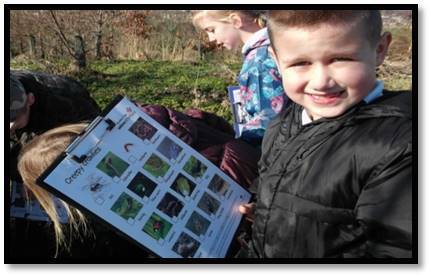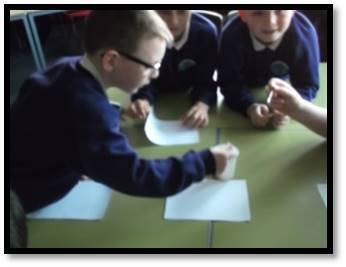Science
All pupils, from Foundation Stage to Year 6, are encouraged to investigate a wide range of scientific topics. They learn by trying different methods and by discussing what they have observed with others.
Living things and life processes
It is very important that the pupils are given as many real life experiences as possible. This can be either through educational visits or by workshops in school.
By the end of KS1 pupils should be able to :
- Describe the basic conditions required for plants and animals to survive (food, water, air, warmth, light).
- Know that living things grow and reproduce.
- Sort living things into groups and say why I have put them in a group.
- Know that different living things are found in different places. (eg. ponds, woods etc.)
By the end of KS2 pupils should be able to :
Use scientific names for some major organs or body systems and I can locate the position of these in my body.
Identify the organs of different plants I observe.
Use keys based on observable features to help me identify and group living things systematically.
Know that feeding relationships exist between plants and animals in a habitat. I can describe this relationship using food chains and terms such as predator and prey.
Physical processes
Pupils learn about the physical processes in world around them eg gravity and air resistance, through a series of investigations. They try to explain some of the properties of the earth by what they observe happening even though they cannot always see the processes that are involved.
By the end of KS1 pupils should be able to :
- Compare the way bulbs work in different electrical circuits.
- Compare the brightness and colour of lights.
- Describe the speed and direction of moving objects.
- Identify changes that happen when the sun goes behind a cloud.
- Describe what happens when wind hits objects.
- Know that ears give information about where sound comes from.
- Know that pushes and pulls are forces and can be grouped.
By the end of KS2 pupils should be able to :
Describe and explain physical phenomena such as how a device may be connected to work in an electrical circuit, how the apparent position of the sun changes over the course of the day.
Make generalisations about physical phenomena. (Eg. motion is affected by forces, including gravitational attraction, magnetic attraction and friction.)
Use physical ideas to explain phenomenon. (Eg. the formation of shadows, sounds being heard through a variety of materials.)
Materials and their properties
Finding out about materials and the properties of materials is important when asking pupils to think scientifically. They test which materials are best for specific uses and explain what the properties are that make them suitable.
By the end of KS1 pupils should be able to :
- Identify a range of common materials and I know some of their properties.
- Compare materials and sort them into groups.
- Describe to others, the reasons for my groupings.
- Describe the changes to some materials by heating, cooling, bending and stretching.
By the end of KS2 pupils should be able to :
Describe the differences between the properties of different materials.
Explain how these differences are used to classify substances (including solids, liquids, gases, acids and alkalis).
Describe methods to separate mixtures. (Filtration, distillation.)
Use scientific terms to describe changes. (Evaporation, condensation.)
Use knowledge of reversible and irreversible changes to make predictions about whether changes are reversible or not.
Key Documents
Science-Intent-Implementation-and-Impact
 |
|






















